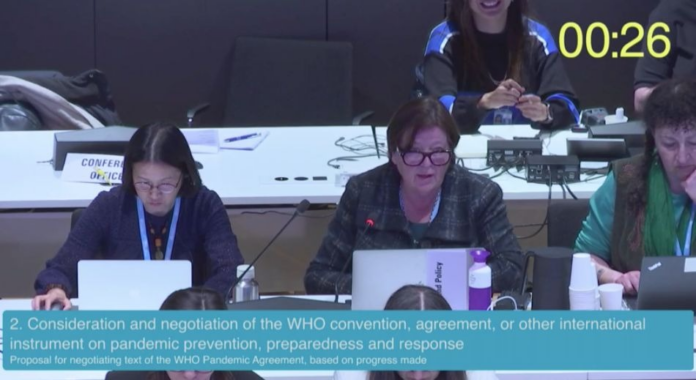This statement was delivered on 19 February at the World Health Organization in Geneva, on the occasion of the 8th Intergovernmental Negotiating Body to draft and negotiate a WHO convention, agreement or other international instrument on pandemic prevention, preparedness and response
Thank you co-chairs for the opportunity to speak.
I should preface my two minutes by saying that our comments are based on draft text referenced in the media. I am pleased that from now on texts will be shared with relevant stakeholders. Thank you for that decision.
Looking back at previous drafts, going back to the Bureau’s ‘0’ draft that kicked off these talks, we see a steady decline in the forcefulness of many of the
provisions. Few hard commitments to action remain. Provisions are increasingly vague, ambiguous, or left to voluntary actions. Difficult topics are avoided or have been removed altogether.
For example, one of the key intellectual property (IP) problems relates to the sharing of vital know-how/trade secrets, the absence of which could block world-wide production of vaccines and other pandemic countermeasures. We have proposed a mechanism to solve this key IP problem. And yet, as we look through the developing draft texts we see mostly watered down attempts to solve this problem, or no attempt at all.
The new instrument needs to solve some hard problems to ensure access to vital IP, know-how, information and products to prevent or combat a future pandemic and that means creating new obligations for WHO member states, not just re-iterating the status quo.
Our preliminary comments focus on art 11 and IP issues:
Article 11 paragraph 5 mentions the role of TRIPS flexibilities in protecting public health and in paragraph 6 Parties’ obligation to review and update national implementation of TRIPS Flexibilities, which is an important provision, particularly in situations where voluntary and mutually agreed solutions are absent. Those flexibilities are not limited to compulsory licensing (Art 31 and Art 31Bis) Other relevant provisions for access to medical tools can – for example – be found in TRIPS Art. 6, 30, 39.3, 44 and 73. It would be helpful to recognise those provisions.
It would be important that Parties agree to not challenge or exert pressure, direct or indirect, on countries that adopt TRIPS flexibilities in their national law and/or resort to the use of TRIPS flexibilities, nor demand the adoption of TRIPS-plus provisions (in that context, Innovarte’s proposal for a reporting mechanism is interesting).
Article 11 should also explicitly mention the need to create and support IP Pooling mechanisms, including the Medicines Patent Pool. The draft text mentions “The Pandemic Technology Access Pool” but only in Chapter III (on governance). IP licensing including IP pooling should be a central part of Article 11.
We are ready to continue to work with delegations on improving the texts that now have been shared with us.
Thank you for your attention.
Ellen ‘t Hoen, LLM PhD, is a lawyer and public health advocate with over 30 years of experience working on pharmaceutical and intellectual property policies.
